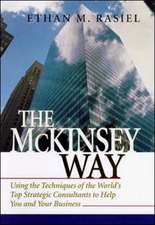The Interaction of Complexity and Management
Editat de Michael R. Lissacken Limba Engleză Hardback – 29 noi 2002 – vârsta până la 17 ani
Preț: 530.49 lei
Preț vechi: 758.13 lei
-30% Nou
Puncte Express: 796
Preț estimativ în valută:
101.50€ • 105.99$ • 83.82£
101.50€ • 105.99$ • 83.82£
Carte tipărită la comandă
Livrare economică 15-29 aprilie
Preluare comenzi: 021 569.72.76
Specificații
ISBN-13: 9781567204278
ISBN-10: 1567204279
Pagini: 328
Dimensiuni: 156 x 235 x 29 mm
Greutate: 0.64 kg
Ediția:New.
Editura: Bloomsbury Publishing
Colecția Praeger
Locul publicării:New York, United States
ISBN-10: 1567204279
Pagini: 328
Dimensiuni: 156 x 235 x 29 mm
Greutate: 0.64 kg
Ediția:New.
Editura: Bloomsbury Publishing
Colecția Praeger
Locul publicării:New York, United States
Notă biografică
MICHAEL R. LISSACK is Director of the Institute for the Study of Coherence and Emergence, Boston, and editor of the journal Emergence. Lissack has taught economics at Williams College, research techniques at Henley, and business ethics at the Rotterdam School of Management. He is author, coauthor, or coeditor of five previous books, including Managing Complexity in Organizations (coedited with Hugh Gunz, 2000).
Cuprins
PrefaceComplexity, Management, Coherence, and Understanding by Michael LissackManagement Perspectives on Complexity TheoriesComplexity and Management: Why Does It Matter? by Ron SchultzComplexity in Human Terms by Roger Lewin and Birute RegineComplexity and Management: Models and Methods by Steve PhelanThe Role of Language by Michael LissackManagerial Insights from Complexity ScienceComplexity and the I-Space by Max BoisotApplying Complexity: Really by Kevin DooleyResearch on Interactions among Management Decisions Jan RivkinComplexity and Leadership by Bill McKelveyComplexity, Bricolage, and Technology by Raghu Garud and Peter KarnoeHuman Complexity by Peter SengeA Few Words on Modeling by Dan LevinthalBeyond "e"-Creating an Intelligent World by Robin WoodTwenty-First-Century Management and the Complexity Paradigm by Hiroshi TasakaBusiness, Complexity, and "New Science" by Irene SandersComplexity Science in PracticeStories and Beliefs by Ron SchultzComplexity and Innovation by John Seely BrownComplexity and Technology: Applied Reality by Bill FulkersonFrom Organic to Complex Knowledge Management through the Use of Story by David SnowdenA Practitioner's Perspective by Mark MichaelsImproving Health Care Quality from the View of Adaptive Systems by Helen HarteAn Action Theory of Complexity by Larry PrusakComplexity and Management: Fad or Frontier?Complexity and Management: Where Do We Stand? by Steve MaguireReality and Complexity by Tom PetzingerFrontier, of Course by Bill FrederickOr Is It a Fad? by Eric AbrahamsonComplexity and Mangement: An Expanding Traveling Wave by Jeffrey GoldsteinComplexity and Organization Science by Arie LewinFinal WordsA Final Thought by Michael LissackBibliographyIndex









